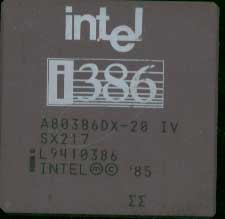

Microprocessor Museum of CPU History for Intel CPUs, AMD Processor History, Cyrix Microprocessors, Microcontrollers and more.
Total CPU's: 2342
Total Manufacturers: 32
Total EPROM's: 23
8038x > IntelA80386DX-20IV
|
|

|
Modified: April 10, 2005, 7:38 pm
|